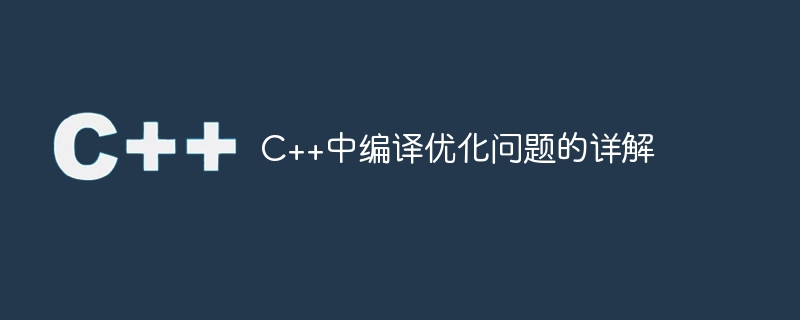Home >Backend Development >C++ >Detailed explanation of compilation optimization issues in C++
Detailed explanation of compilation optimization issues in C++
- 王林Original
- 2023-10-08 09:41:33931browse

Detailed explanation of compilation optimization issues in C
Writing efficient C code is the goal pursued by every programmer, and compilation optimization is one of the important aspects. Correctly understanding and applying compilation optimizations can greatly improve the performance and efficiency of your programs. This article will start with the basic principles of C compilation optimization, common optimization techniques and specific code examples, and analyze the compilation optimization issues in C in detail.
1. Basic principles of compilation optimization
Before understanding compilation optimization, we first need to understand how the compiler works. A compiler converts high-level language code into machine code so that the computer can execute it directly. Compilation optimization is to improve the performance and efficiency of the program as much as possible by analyzing and reorganizing the code during this conversion process.
The core idea of compilation optimization is to reduce unnecessary calculations and memory accesses, and to optimize the performance of the program by reducing the complexity of the program and increasing the execution speed of the code.
2. Common compilation optimization techniques
- Constant Folding: During the compilation process, the compiler will calculate the constant expression and replace the result with the original expression. This can reduce the amount of calculations during runtime of the program and improve the execution speed of the program.
Sample code:
int x = 10; int y = 20; int z = x + y;
Code after constant folding optimization:
int z = 30;
- Loop Unrolling: The compiler will Multiple iterations of are expanded into a single iteration. This can reduce the number of iterations of the loop and improve the execution speed of the program.
Sample code:
for (int i = 0; i < 10; i++) {
// do something
}Code after loop expansion optimization:
// do something 10 times
- Inline Function: The compiler will The call is replaced by direct insertion of the function body, reducing the cost of function calls. This can improve the execution efficiency of the program.
Sample code:
inline int add(int x, int y) {
return x + y;
}
int result = add(10, 20);Code optimized with inline functions:
int result = 10 + 20;
- Data-flow Analysis: Compiler By analyzing the data flow of the program, we can understand the use and changes of variables in the program to optimize it. For example, unused variables can be deleted to reduce the memory footprint of the program.
Sample code:
int x = 10; int y = 20; int z = x + y;
Code optimized after data flow analysis:
int z = 30;
3. Precautions for compilation optimization
Although compilation Optimization can improve program performance, but sometimes it may bring about some unexpected problems. When using compilation optimization, you need to pay attention to the following points:
- Portability issues: Different compilers may have different support and implementation methods for compilation optimization, so some optimization techniques may Different compilers produce different results. In order to ensure the portability of the code, attention needs to be paid to the compatibility and correctness of the compiler.
- Readability issues: Excessive compilation optimization may cause the code to become obscure and reduce the readability of the code. Therefore, when performing compilation optimization, you need to weigh the readability and performance of the code.
- Optimization in specific scenarios: Compilation optimization technology often only works in specific scenarios, so it is necessary to choose the appropriate optimization technology based on specific application scenarios and needs.
4. Summary
Writing efficient C code requires an in-depth understanding of the principles and techniques of compilation optimization. This article starts with the basic principles of compilation optimization, common optimization techniques and precautions, and provides a detailed analysis of compilation optimization issues in C through specific code examples. Mastering compilation optimization technology can improve the execution speed and responsiveness of the program while ensuring the performance and efficiency of the code.
The above is the detailed content of Detailed explanation of compilation optimization issues in C++. For more information, please follow other related articles on the PHP Chinese website!
Related articles
See more- C++ compilation error: A header file is referenced multiple times, how to solve it?
- C++ compilation error: wrong function parameters, how to fix it?
- C++ error: The constructor must be declared in the public area, how to deal with it?
- Process management and thread synchronization in C++
- How to deal with data splitting problems in C++ development

